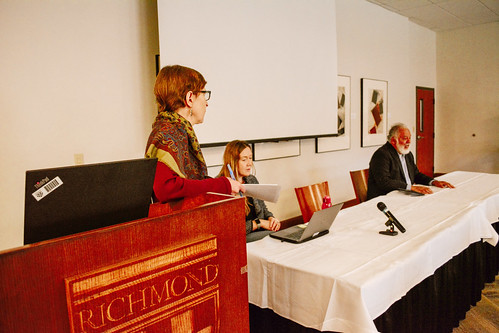A&S hosts Contested Spaces event about walls and borders around the world
On February 28th in the Richmond Room, the departments of history, sociology & anthropology, and languages, literatures, and cultures hosted a scholarly conference entitled “Walls, Borders, and Partitions in Global Perspective.” The conference was held as part of this year’s Contested Spaces in which the 2019-20 focal point is “This Ground.”
Dean Patrice Rankine welcomed the attendees with an address in which he referred to Robert Frost’s poem “Mending Wall,” written in the early days of World War I. In the poem is the well-known line: “‘Good fences make good neighbors.’” However, Frost promptly responds to that claim with “Why do they make good neighbors?” Throughout the poem, Frost is contemplating the purpose of borders and divisions between people, and that same contemplation was echoed throughout the conference.
The conference featured panels comprised of UR faculty members and external scholars from around the world. In the panels, professors discussed walls around the world and the repercussions on the people, on both a local and global scale.
For instance, Dr. Laura McAtackney, who currently works at Aarhus University in Denmark, has lived in Belfast, Northern Ireland for most of her life. During the first panel, entitled “The Problem with Walls: Migration, Peace, and the Politics of Division,” McAtackney discussed the material segregation of peace walls that arose as a result of the Troubles that began in Northern Ireland in 1968.
McAtackney explained how many people in Northern Ireland themselves, unless they live by one, do not know where peace walls are because they are not labeled on a map. She emphasized that these peace walls, also referred to as peace lines, negatively affect the working class in Belfast and continue to have a permanent presence in their community.
McAtackney said that although the communities around the walls may evolve, the walls continue to limit people’s interactions with people on the other side.
“Circumstances change, but the walls don’t,” McAtackney said.
After the two speakers for the panels give their presentations, there was also a moderated discussion in which audience members could ask the scholars questions.
In the first moderated discussion, an audience member asked the professors how permanent they believe walls are and whether they will begin to disappear in the future. Dr. Miguel Díaz Barriga, professor and chair of the Department of Sociology and Anthropology at UR, was standing in for Dr. Élisabeth Vallet from University of Quebec - Montreal as she was unable to attend due to an airport closure. Barriga said he is concerned that walls have become so much a part of national identity and that the normalization of walls suggests they will be here for a while.
He then asked how people can stand up to a physical reproduction of nationalism. “How does one present a counter to walls? What does resistance look like?” he asked. “There’s a lack of ability for people to discuss these issues in meaningful ways.”
Senior Anthony Isenhour attended the conference because he is in a German class and his professor, Dr. Katrina Nousek, encouraged her students to attend.
“Everything that’s going on now with the Berlin Wall divide is culturally interesting particularly in comparison to other walls and divides we see, which is what the rest of the conference is all about,” Isenhour said. “It’s interesting to learn about the geopolitical repercussions that occur as a result of these walls.”
After the two panel discussions, Dr. Edith Sheffer from University of California, Berkeley gave the keynote in which she discussed the origins of the Iron Curtain in Germany and expanded on the permanent repercussions of walls in other cultures as well, such as the U.S. and Mexico and Israel.
Through Contested Spaces events such as this, A&S hopes to give faculty, staff, and students the opportunity to come together and foster meaningful conversations about our roles on campus and in society.

